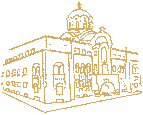|
Information
Service of
the Serbian Orthodox Church
December 15, 2004

BUDIMIR
ALEKSIC ON MEDIA TREATMENT OF NIKSIC CONFERENCE
Commenting
for Radio Svetigora on the inadequate treatment by Montenegrin
media of the recently held conference in defense of the Serbian
language in Niksic in which many of our most eminent intellectuals
took part and expressed their support for the declaration in defense
of the Serbian language, one of the participants in that conference,
Budimir Aleksic, said that “this treatment by the media should
hardly come as a surprise because it is obvious that the media
in Montenegro is not free”.
He emphasized
that he was not surprised that the conference in defense of the
Serbian language in Niksic, which represented a cultural event
of the first order, was not covered by the media, saying that
this was proof that the media are not free and that approximately
400,000 residents of Montenegro who speak Serbian are victims
of discrimination.
“Discrimination
against such a large number of people in our country makes it
necessary for us to appeal to the international community and
important institutions, which we be believe will not permit this
kind of violation of human rights and pressure against one people,”
said Mr. Aleksic, reminding that “the absolute majority of the
residents of our republic speaks the Serbian language, which has
existed for at least one thousand years”.
“What is happening
today in the 21st century in Montenegro is unprecedented violence,”
stated Mr. Aleksic.
According
to the official census held at the end of 2003, 63.49 percent
of the residents of Montenegro consider the Serbian language to
be their native language, while 22 percent of citizens speak Montenegrin.
Therefore, approximately 393,000 residents consider the Serbian
language to be their mother tongue, while only 136,000 speak Montenegrin.
Among other statistical data, also worth noting is that 74 percent
of Montenegrins consider themselves to be Orthodox by religion,
3.5 percent are Roman Catholic, and 18 percent are Muslim.
Source:
Svetigora Press

RUSSIAN
ORTHODOX CHURCH PROPOSES SELECTION
OF PATRON SAINT FOR INTERNET USERS
With the increasing
use of computers in daily life, some Orthodox clergy feel, the
time has come to designate an Orthodox Church saint to serve as
spiritual patron to Internet users.
A few years
ago, the Roman Catholic Church nominated a patron saint for the
Internet - St Isidore, the Bishop of Seville.
However, for
Russian Orthodox believers, the choice for them has been narrowed
down to two possibilities: Saint John Chrysostom, and Saint Theophan
the Recluse.
Responding
to the question, "What is the Internet?" Deacon Andrey
Kurayev noted: "It is a typically monastic pursuit. I am
totally hidden from the public, it is quite impersonal - but at
the same time I can take part in various discussion forums."
He
believes the thousands of Russian Orthodox Internet users could
only benefit from a virtual patron saint dedicated to them.

IOCC
AND VLADE DIVAC GROUP 7 CHILDREN’S FOUNDATION “CONNECTING KIDS”
PROJECT BRINGS COMPUTERS TO SERBIAN STUDENTS
As Serbia-Montenegro
schools struggle to keep pace with technology, a window to the
world is opening up for hundreds of school children in rural and
suburban areas of the former Yugoslavia. Those children, along
with their teachers and other school representatives, will gather
at the “Bozidar Adzija” Technical University in Belgrade this
week (Dec. 16-18) for a School Fair that will celebrate their
newfound knowledge of computers and the connections that computers
can bring.
The middle-school
students are part of the “Connecting Kids” project, begun by International
Orthodox Christian Charities (IOCC) and the Vlade Divac Group
7 Children’s Foundation in May.
Through the
pilot project, IOCC and Group 7 are providing computer equipment
and training to the participating schools, as well as creating
a network to connect children and allow them to communicate with
each other. The network consists of two schools each in Nis, Batocina
and Belgrade municipalities, and one school each in Arandjelovac,
Brus and Prijepolje municipalities.
To
learn more about IOCC's humanitarian programs in the former Yugoslavia,
please visit www.iocc.org.

[Serbian
Translation Services]

Copyright © 1999-2004 by
The Information Service of
the Serbian Orthodox Church
11000 Belgrade
Kralja Petra I no.5
+381 11 3282 596
e-mail
|

